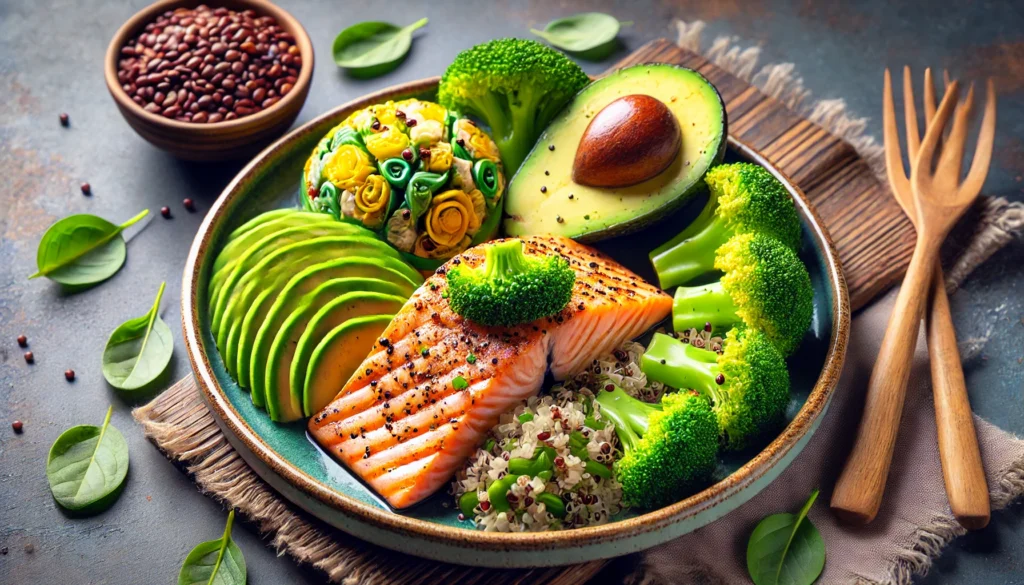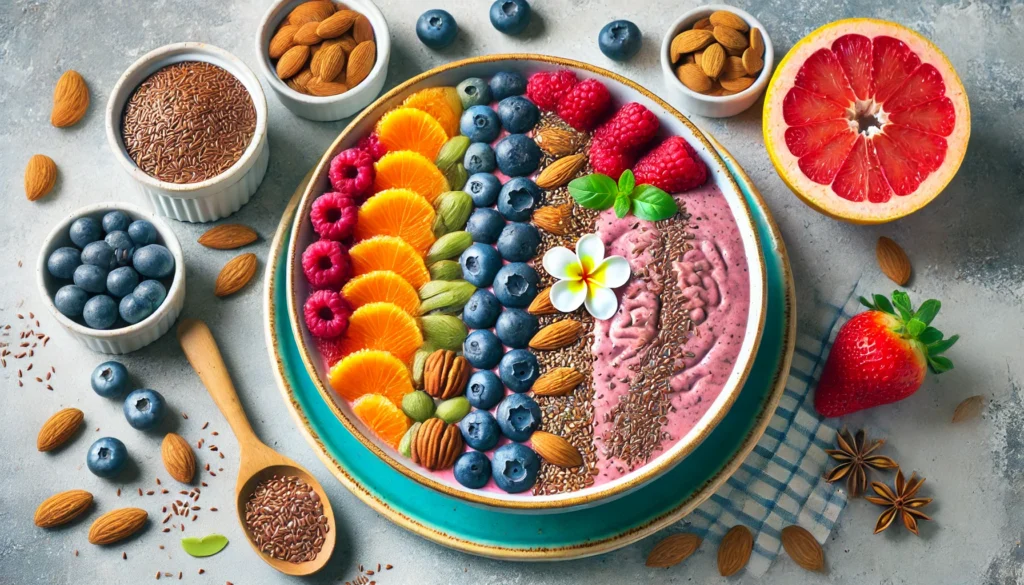As we age, maintaining cognitive health becomes increasingly important. For seniors, incorporating brain-boosting foods into their diet is a practical and effective way to support memory, concentration, and overall brain function. In this article, we’ll explore some of the best brain foods for seniors, delve into the science behind their benefits, and provide practical tips for incorporating these foods into daily meals. Let’s embark on this journey to a healthier brain.
You may also like: Memory-Boosting Foods You Should Try Today
The Science Behind Brain Foods
Before we dive into specific foods, it’s important to understand why certain foods are beneficial for brain health. The brain requires a variety of nutrients to function optimally, including omega-3 fatty acids, antioxidants, vitamins, and minerals. These nutrients help reduce inflammation, protect neurons, and promote the growth of new brain cells, all of which are crucial for maintaining cognitive function.
The Role of Omega-3 Fatty Acids
Omega-3 fatty acids, particularly docosahexaenoic acid (DHA) and eicosapentaenoic acid (EPA), are vital for brain health. They are integral components of cell membranes in the brain and contribute to improved cognitive function, memory, and mood. Research has shown that a diet rich in omega-3s can reduce the risk of neurodegenerative diseases, such as Alzheimer’s.
Omega-3s are found in high concentrations in the brain and are essential for maintaining cell membrane fluidity. This fluidity is crucial for the function of neurotransmitter receptors, which play a key role in brain communication. Studies have demonstrated that increasing omega-3 intake can enhance synaptic plasticity, leading to improved learning and memory capabilities.
Furthermore, omega-3 fatty acids have been linked to a reduction in brain inflammation. Chronic inflammation is a known contributor to cognitive decline and neurodegenerative disorders. By incorporating omega-3-rich foods into their diet, seniors can potentially slow down cognitive deterioration and support overall brain health.
Antioxidants and Brain Protection
Antioxidants play a crucial role in protecting the brain from oxidative stress, which can damage cells and contribute to aging and cognitive decline. Foods rich in antioxidants help neutralize free radicals and reduce inflammation, which can improve brain health and function.
Oxidative stress occurs when there is an imbalance between free radicals and antioxidants in the body. This imbalance can lead to cellular damage, affecting brain cells and impairing cognitive functions. Antioxidants, such as flavonoids and polyphenols, have the capability to scavenge these free radicals, thus offering a protective shield to brain cells.
Research has shown that diets high in antioxidants can delay brain aging and improve memory and cognitive function. These benefits are attributed to the ability of antioxidants to enhance neurogenesis, the process of forming new neurons, and their potential to improve cerebral blood flow, ensuring that the brain receives an adequate supply of nutrients and oxygen.
Essential Vitamins and Minerals
Certain vitamins and minerals, such as B vitamins, vitamin E, and magnesium, are essential for brain health. They support various functions, including neurotransmitter synthesis, nerve function, and energy production. Ensuring an adequate intake of these nutrients can help maintain cognitive performance as we age.
B vitamins, including B6, B9 (folate), and B12, are particularly important for brain health. They are involved in the production of neurotransmitters, such as serotonin and dopamine, which regulate mood and cognitive function. Deficiencies in these vitamins have been linked to depression, cognitive decline, and memory impairment.
Vitamin E is a powerful antioxidant that helps protect brain cells from oxidative damage. It has been associated with a reduced risk of Alzheimer’s disease and cognitive decline. Similarly, magnesium plays a critical role in synaptic plasticity, the process that allows the brain to adapt and learn new information. Sufficient magnesium levels are crucial for maintaining memory and cognitive function as we age.
Best Brain Foods for Seniors
With the scientific foundation laid, let’s explore specific foods that seniors should consider incorporating into their diets to boost brain health.
Fatty Fish: A Source of Omega-3s
Fatty fish, such as salmon, mackerel, and sardines, are excellent sources of omega-3 fatty acids. Consuming these fish regularly can provide the brain with the DHA and EPA needed for optimal function. Aim to include fatty fish in your diet at least twice a week for maximum benefits.
Salmon, in particular, is renowned for its high omega-3 content and is often recommended for its potential to enhance memory and protect against cognitive decline. Grilling or baking salmon with a sprinkle of herbs can make for a delicious and brain-healthy meal.
Mackerel and sardines are also rich in omega-3s and provide a good source of vitamin D, which is vital for brain health. Incorporating these fish into sandwiches or salads can be a simple way to enjoy their benefits without the fuss of complicated recipes.
For those who prefer plant-based options, algae-based supplements can provide a vegetarian source of DHA and EPA. These supplements can be a convenient way for seniors to ensure they receive an adequate intake of omega-3s.
Blueberries: Antioxidant Powerhouses
Blueberries are packed with antioxidants, particularly flavonoids, which have been shown to improve memory and cognitive function. Studies suggest that regular consumption of blueberries can delay brain aging and enhance brain function. Add them to your breakfast cereal, yogurt, or smoothies for a delicious and nutritious boost.
The vibrant color of blueberries is a testament to their high anthocyanin content, a type of flavonoid with potent antioxidant properties. This compound has been linked to improved communication between brain cells and enhanced memory.
Incorporating blueberries into baked goods, such as muffins or pancakes, can provide a sweet treat while delivering a dose of brain-boosting nutrients. For a refreshing snack, consider freezing blueberries and enjoying them as a cool, antioxidant-rich snack during warmer months.
In addition to blueberries, other berries like strawberries and blackberries also offer similar cognitive benefits. Including a variety of berries in your diet can provide a diverse range of antioxidants to support brain health.

Walnuts: Nutrient-Dense Brain Fuel
Walnuts are another excellent source of omega-3 fatty acids and antioxidants. They have been linked to improved cognitive performance and memory. Snack on a handful of walnuts as a mid-day treat or add them to salads and baked goods for added crunch and nutrition.
Rich in alpha-linolenic acid (ALA), a plant-based omega-3, walnuts are known to reduce inflammation and oxidative stress in the brain. These benefits can lead to enhanced cognitive functions and a reduced risk of neurodegenerative diseases.
Including walnuts in trail mixes or as a topping for oatmeal and yogurt can offer a convenient way to incorporate them into your diet. Their crunchy texture and rich flavor make them a versatile ingredient for both sweet and savory dishes.
For an added brain boost, consider making a walnut-based pesto sauce by blending walnuts with basil, garlic, olive oil, and Parmesan cheese. This flavorful sauce can be used with pasta or as a spread for sandwiches.
Dark Chocolate: A Sweet Brain Booster
Dark chocolate, rich in flavonoids, caffeine, and antioxidants, can enhance brain function. Flavonoids have been shown to improve blood flow to the brain and support memory and attention. Choose dark chocolate with at least 70% cocoa content and enjoy it in moderation for a brain-boosting treat.
The flavonoids in dark chocolate can stimulate the production of nitric oxide, a compound that relaxes blood vessels and improves circulation. This increased blood flow ensures that the brain receives an ample supply of oxygen and nutrients, promoting cognitive health.
Incorporating small amounts of dark chocolate into your diet, such as by adding cocoa powder to smoothies or enjoying a square of chocolate after meals, can provide a satisfying way to boost brain function.
Pairing dark chocolate with nuts or berries can enhance its cognitive benefits while adding a variety of flavors and textures. This combination makes for a delightful and nutritious dessert or snack option.
Leafy Greens: Nutrient-Rich Cognitive Support
Leafy greens like spinach, kale, and collard greens are rich in brain-healthy nutrients, including vitamin K, lutein, folate, and beta carotene. These nutrients have been associated with slower cognitive decline. Incorporate leafy greens into salads, soups, or smoothies to reap their benefits.
Spinach is particularly high in lutein, a carotenoid that has been linked to improved visual and cognitive functions. Its mild flavor makes it a versatile ingredient that can be easily added to a variety of dishes.
Kale, known for its robust nutrient profile, is rich in vitamin K and folate, both of which play crucial roles in brain health. Massaging kale leaves with olive oil and lemon juice can create a tender salad base that pairs well with other brain-boosting ingredients.
Collard greens, often used in Southern cuisine, are packed with beta carotene and can be a hearty addition to stews and soups. Their slightly bitter flavor can be balanced with sweet or tangy dressings for a well-rounded dish.
Turmeric: The Golden Spice for Brain Health
Turmeric, a spice known for its anti-inflammatory properties, contains the active compound curcumin. Curcumin has been shown to cross the blood-brain barrier and may help improve memory and stimulate the production of new brain cells. Add turmeric to curries, soups, or teas to enjoy its brain-boosting effects.
The anti-inflammatory effects of curcumin are particularly beneficial for reducing chronic brain inflammation, which is associated with cognitive decline. Turmeric’s bright yellow color adds vibrancy to dishes while offering significant health benefits.
Incorporating turmeric into your diet can be as simple as adding a pinch to scrambled eggs or blending it into a smoothie with fruits and greens. Turmeric lattes, also known as “golden milk,” have gained popularity for their soothing flavor and health benefits.
For those who enjoy experimenting with flavors, turmeric can be combined with black pepper to enhance its absorption and effectiveness. This combination can be used in spice rubs for meats or sprinkled over roasted vegetables.
Practical Tips for Incorporating Brain Foods
Now that you know which foods to focus on, here are some practical tips for incorporating them into your daily diet:
Plan Your Meals
Start by planning your meals around brain-healthy ingredients. Incorporate fatty fish, leafy greens, and berries into your weekly meal plan.
Meal planning can help ensure that you consistently include brain-boosting foods in your diet. Begin by selecting a few key ingredients each week and building meals around them. This approach can simplify grocery shopping and meal preparation.
Consider preparing a weekly menu that includes a variety of brain foods, such as a salmon salad, a spinach and blueberry smoothie, and a walnut-encrusted chicken dish. This variety can help keep meals exciting and nutritionally balanced.
Planning meals in advance also allows you to make the most of seasonal produce, which can be more affordable and flavorful. Look for recipes that incorporate seasonal brain foods to enjoy their peak freshness and nutritional benefits.

Snack Smart
Keep a stash of brain-boosting snacks, such as walnuts and dark chocolate, on hand for when hunger strikes.
Having nutritious snacks readily available can help you make healthier choices throughout the day. Pre-portioning snacks into small containers or bags can make it easy to grab a quick and satisfying treat when needed.
Consider pairing walnuts with dried berries for a portable snack mix that provides a balance of omega-3s and antioxidants. This combination is perfect for a mid-afternoon energy boost.
For a sweet and brain-healthy treat, enjoy a piece of dark chocolate with a handful of almonds or pistachios. The combination of flavors and textures can satisfy cravings while supporting cognitive health.
Experiment with Recipes
Try new recipes that feature brain-boosting ingredients. For example, make a blueberry and walnut salad or a turmeric-spiced soup.
Exploring new recipes can make incorporating brain foods into your diet more enjoyable and sustainable. Look for recipes that highlight the flavors and textures of brain-boosting ingredients in creative ways.
A blueberry and walnut salad can be enhanced with goat cheese and a balsamic vinaigrette for a delicious and nutritious meal. Similarly, a turmeric-spiced soup can be made with lentils and vegetables for a comforting and brain-healthy dish.
Experimenting with recipes can also introduce you to new cooking techniques and flavor combinations. This exploration can help broaden your culinary skills and increase your appreciation for brain-boosting foods.
Make Smoothies
Blend leafy greens, berries, and a scoop of nut butter into a smoothie for a quick and nutritious brain-boosting breakfast or snack.
Smoothies are an excellent way to pack multiple brain-boosting ingredients into a convenient and delicious drink. Start with a base of leafy greens, such as spinach or kale, and add a variety of berries for sweetness and antioxidants.
Incorporate a source of healthy fats, such as nut butter or avocado, to enhance the smoothie’s texture and provide sustained energy. A scoop of protein powder or Greek yogurt can also be added for an extra nutritional boost.
Experiment with different flavor combinations, such as a spinach, blueberry, and almond butter smoothie, to find your favorite blend. Smoothies can be customized to suit your taste preferences and nutritional needs, making them a versatile addition to your diet.
Stay Consistent
Consistency is key. Aim to include a variety of brain-boosting foods in your diet regularly to experience their full benefits.
Incorporating brain-boosting foods into your diet is most effective when done consistently over time. Try to make these foods a regular part of your meals and snacks to support ongoing cognitive health.
Set realistic goals for incorporating brain foods into your diet, such as including one brain-boosting ingredient in each meal. This approach can help you gradually build healthy habits without feeling overwhelmed.
Remember that consistency doesn’t mean perfection. It’s okay to indulge in your favorite treats occasionally, as long as you maintain a balanced diet that prioritizes brain-healthy foods.
Future Implications and Trends
As research on brain health continues to evolve, we can expect to see new trends and recommendations emerge. The growing interest in personalized nutrition and the role of the gut-brain axis in cognitive health are areas to watch. As science advances, we may uncover even more ways to support brain health through diet and lifestyle.
Personalized Nutrition
Personalized nutrition focuses on tailoring dietary recommendations to an individual’s genetic makeup, lifestyle, and health needs. This approach aims to optimize health outcomes by considering the unique factors that influence an individual’s response to different foods.
Advancements in genetic testing and nutritional science are paving the way for more personalized dietary plans that can address specific cognitive health concerns. As this field continues to develop, seniors may benefit from customized dietary recommendations that target their individual brain health needs.
Personalized nutrition has the potential to enhance the effectiveness of brain-boosting diets by identifying the most beneficial foods and nutrients for each person. This tailored approach could lead to more precise and effective strategies for maintaining cognitive health.
The Gut-Brain Axis
The gut-brain axis is the bidirectional communication pathway between the gastrointestinal tract and the brain. Emerging research suggests that gut health plays a significant role in cognitive function and mental well-being.
A healthy gut microbiome, composed of diverse and beneficial bacteria, can positively influence brain health by producing neurotransmitters and reducing inflammation. Diets rich in fiber, prebiotics, and probiotics can support a balanced gut microbiome and potentially enhance cognitive health.
As our understanding of the gut-brain axis deepens, dietary recommendations may increasingly focus on promoting gut health as a means of supporting brain function. This holistic approach could lead to more comprehensive strategies for maintaining cognitive health in seniors.

Emerging Superfoods
As research continues to explore the impact of diet on brain health, new superfoods may emerge with promising cognitive benefits. These foods could offer additional options for supporting brain health and enhancing cognitive function.
Potential emerging superfoods may include exotic fruits, herbs, and spices with unique nutrient profiles and health benefits. As these foods gain popularity, they may become more accessible and integrated into mainstream diets.
Staying informed about emerging superfoods and their potential cognitive benefits can provide seniors with new opportunities to diversify their diets and support brain health. This ongoing exploration of dietary options can help enhance overall well-being and quality of life.
In conclusion, incorporating brain-boosting foods into your diet is a practical and effective way to support cognitive health as you age. By understanding the science behind these foods and following practical tips for their inclusion, seniors can enjoy improved memory, focus, and overall brain function. Embrace these delicious and nutritious foods to support a healthy brain and enhance your quality of life.
Further Reading:
Cognitive Health: Top 11 Brain Foods for Seniors
Eating for Your Brain as a Senior
Foods linked to better brainpower
Important Note: The information contained in this article is for general informational purposes only, and should not be construed as health or medical advice, nor is it intended to diagnose, prevent, treat, or cure any disease or health condition. Before embarking on any diet, fitness regimen, or program of nutritional supplementation, it is advisable to consult your healthcare professional in order to determine its safety and probable efficacy in terms of your individual state of health.
Regarding Nutritional Supplements Or Other Non-Prescription Health Products: If any nutritional supplements or other non-prescription health products are mentioned in the foregoing article, any claims or statements made about them have not been evaluated by the U.S. Food and Drug Administration, and such nutritional supplements or other health products are not intended to diagnose, treat, cure, or prevent any disease.


